Author Archives: borehead - Moderator
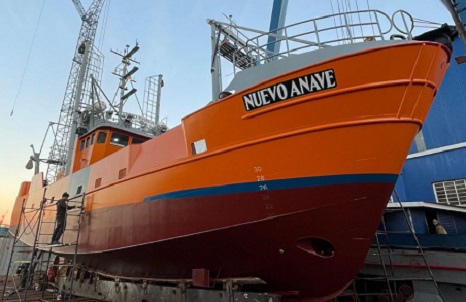
Contessi Launches Fresher Trawler for Rawson
The Contessi shipyard in Mar del Plata launched at the beginning of August a new coastal fresher trawler built to fish from the port of Rawson for Argentine red shrimp. Nuevo Anave is the latest of a proven series of boats, with 17 trawlers of the same design already operating along the coast of Argentina. ‘This is a classic design by our shipyard. When we look at the landings of Argentine red shrimp over the last year, we see four of this design of trawler among the top five catchers on the list,’ said yard director Domingo Contessi. Raúl Matías Cereseto one of the owners of fishing vessel Nuevo Anave, confirmed that it was precisely for this reason that he and his associate decided to order a boat of this design. There are around ten boats of that pattern operating in Rawson and we already knew that it had great efficiency. We saw how our colleagues had positive results concerning stability and performance,’ he said. Photos, >click to read< 13:53
Bristol Bay fleets call for greater price transparency
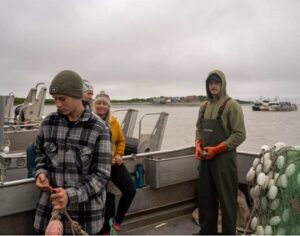 There’s a multi-decade precedent for Bristol Bay salmon processors to wait until the season is underway to announce what they’re willing to pay. Peter Pan shook up the industry in 2021 and 2022 by announcing a base price at the start of the season, but this year waited until mid-July, along with other processors in the region. Captain Konrad Schaad, of the Fishing Vessel Skua, says this model hurts fishers. “The producer gets paid what’s left over. We produce the fish and then it gets processed and sold and everything and everybody gets their cut, and then the morsels that are leftover, they give to us. There should be a fixed cost for what we produce here,” he said. In Bristol Bay, commercial fishing crews fish on what’s called an ‘open ticket. >click to read< 12:53
There’s a multi-decade precedent for Bristol Bay salmon processors to wait until the season is underway to announce what they’re willing to pay. Peter Pan shook up the industry in 2021 and 2022 by announcing a base price at the start of the season, but this year waited until mid-July, along with other processors in the region. Captain Konrad Schaad, of the Fishing Vessel Skua, says this model hurts fishers. “The producer gets paid what’s left over. We produce the fish and then it gets processed and sold and everything and everybody gets their cut, and then the morsels that are leftover, they give to us. There should be a fixed cost for what we produce here,” he said. In Bristol Bay, commercial fishing crews fish on what’s called an ‘open ticket. >click to read< 12:53
The EU and UK reach three agreements on fisheries management
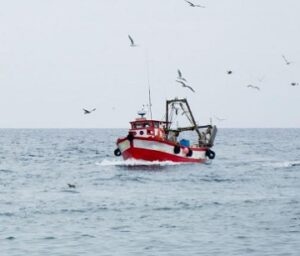 The EU-UK Specialised Committee on Fisheries (SCF) reached three agreements for better fisheries management between the EU and UK. The agreements include a mechanism for voluntary transfers of fishing opportunities between the EU and UK, common guidelines for notifying management measures to the other party, improvements to the management of four shared stocks (lemon sole, witch, turbot and brill). Commissioner for Environment, Oceans and Fisheries, Virginijus Sinkevičius, said: “These agreements demonstrate that the EU and UK can work effectively together under the framework of the EU-UK Trade and Cooperation Agreement. These agreements will improve the sustainable management of our shared fishing stocks and support both our fleets. It demonstrates the success of our work together to normalise our new fisheries relationship and sets a strong basis for continued cooperation on shared management challenges.” >click to read< 10:42
The EU-UK Specialised Committee on Fisheries (SCF) reached three agreements for better fisheries management between the EU and UK. The agreements include a mechanism for voluntary transfers of fishing opportunities between the EU and UK, common guidelines for notifying management measures to the other party, improvements to the management of four shared stocks (lemon sole, witch, turbot and brill). Commissioner for Environment, Oceans and Fisheries, Virginijus Sinkevičius, said: “These agreements demonstrate that the EU and UK can work effectively together under the framework of the EU-UK Trade and Cooperation Agreement. These agreements will improve the sustainable management of our shared fishing stocks and support both our fleets. It demonstrates the success of our work together to normalise our new fisheries relationship and sets a strong basis for continued cooperation on shared management challenges.” >click to read< 10:42
Commercial Fisherman Fredrick (Fred) Reno Italo Arnoldi of Morro Bay, has passed away
 Fred left on his Eternal Hunting and Fishing Trip in the early morning hours on June 27, 2023, passing peacefully in his home in Morro Bay, with his wife Diane and his sister Janice by his side. Fred was born January 3, 1951 raised in Santa Barbara where he attended Lincoln Elementary School, La Cumbre Junior High School, and Santa Barbara High School 1970. He left Santa Barbara to become a commercial fisherman up until his last day on earth. He fished salmon in Alaska and the South Seas. Fred seined in San Pedro, and fished herring in San Francisco. Fred owned several vessels including Drifter, Halcyon, Roselena Marie, H2O K-9 and Amakua. A Celebration of Life will be held August 19 from 11:00 AM to 3:00 PM at the Veteran’s Memorial Building, 209 Surf Street, Morro Bay. All are invited. >click to read< 09:51
Fred left on his Eternal Hunting and Fishing Trip in the early morning hours on June 27, 2023, passing peacefully in his home in Morro Bay, with his wife Diane and his sister Janice by his side. Fred was born January 3, 1951 raised in Santa Barbara where he attended Lincoln Elementary School, La Cumbre Junior High School, and Santa Barbara High School 1970. He left Santa Barbara to become a commercial fisherman up until his last day on earth. He fished salmon in Alaska and the South Seas. Fred seined in San Pedro, and fished herring in San Francisco. Fred owned several vessels including Drifter, Halcyon, Roselena Marie, H2O K-9 and Amakua. A Celebration of Life will be held August 19 from 11:00 AM to 3:00 PM at the Veteran’s Memorial Building, 209 Surf Street, Morro Bay. All are invited. >click to read< 09:51
Local Spotlight: Craig Pendleton
 Ever since he was a nine-year-old boy standing on a dock in Camp Ellis, Craig Pendleton has been constantly scanning the horizon, looking for the next opportunity that lies ahead. Pendleton began his career in commercial fishing when he was just nine years old, working on his uncle’s lobster boat during the summer. By the time he was 12, he was earning more money during the summer than his mother earned from her year-round job as a clerk at Percy’s Pharmacy. From his start as a kid working on a lobster boat, Pendleton eventually became a respected source of information and the proverbial go-to-guy for people like Senator Olympia Snowe, Governor John Baldacci and Senator Angus King when it came time to talk about maritime and commercial fishing issues. >click to read< 08:45
Ever since he was a nine-year-old boy standing on a dock in Camp Ellis, Craig Pendleton has been constantly scanning the horizon, looking for the next opportunity that lies ahead. Pendleton began his career in commercial fishing when he was just nine years old, working on his uncle’s lobster boat during the summer. By the time he was 12, he was earning more money during the summer than his mother earned from her year-round job as a clerk at Percy’s Pharmacy. From his start as a kid working on a lobster boat, Pendleton eventually became a respected source of information and the proverbial go-to-guy for people like Senator Olympia Snowe, Governor John Baldacci and Senator Angus King when it came time to talk about maritime and commercial fishing issues. >click to read< 08:45
Federal Appeals Court upholds ruling for shrimp trawlers in Clean Water Act dispute
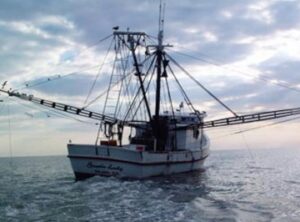 The 4th US Circuit Court of Appeals has affirmed a lower court decision favoring shrimp trawlers in a dispute tied to the Clean Water Act. A three-judge appellate panel agreed unanimously with the dismissal of legal complaints against the trawlers. “Fisheries Reform Group alleges that shrimp trawlers operating in North Carolina’s Pamlico Sound are violating the Clean Water Act by engaging in two types of unpermitted activity: throwing bycatch overboard and disturbing sediment with their trawl nets. But these activities do not violate the Clean Water Act,” wrote Appeals Court Judge Julius Richardson. The seven named defendants in the case are commercial shrimpers in Pamlico Sound. They harvest shrimp by dragging trawl nets along the ocean’s floor. >click to read< 07:58
The 4th US Circuit Court of Appeals has affirmed a lower court decision favoring shrimp trawlers in a dispute tied to the Clean Water Act. A three-judge appellate panel agreed unanimously with the dismissal of legal complaints against the trawlers. “Fisheries Reform Group alleges that shrimp trawlers operating in North Carolina’s Pamlico Sound are violating the Clean Water Act by engaging in two types of unpermitted activity: throwing bycatch overboard and disturbing sediment with their trawl nets. But these activities do not violate the Clean Water Act,” wrote Appeals Court Judge Julius Richardson. The seven named defendants in the case are commercial shrimpers in Pamlico Sound. They harvest shrimp by dragging trawl nets along the ocean’s floor. >click to read< 07:58
Herring disaster funds should be used to phase out harmful trawling
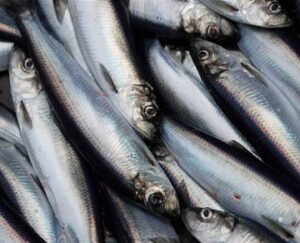 The Atlantic States Marine Fisheries Commission is releasing $11 million in disaster relief funds to Atlantic herring harvesters, of which $7 million will go to Maine. These funds should be used to phase out herring trawling by buying back fishing permits in an effort to increase herring stocks and to protect other marine life. U.S. Atlantic herring landings in the 2000s averaged 206 million pounds annually but have since decreased to below 22 million pounds in 2020 and 2021. The New England Fishery Management Council led a process to craft a 10-year rebuilding plan. This dramatic downturn in herring is likely because variables with climate change are reducing ocean productivity resulting in seven consecutive years of low numbers of young fish surviving to maturity. >click to read< 12:58
The Atlantic States Marine Fisheries Commission is releasing $11 million in disaster relief funds to Atlantic herring harvesters, of which $7 million will go to Maine. These funds should be used to phase out herring trawling by buying back fishing permits in an effort to increase herring stocks and to protect other marine life. U.S. Atlantic herring landings in the 2000s averaged 206 million pounds annually but have since decreased to below 22 million pounds in 2020 and 2021. The New England Fishery Management Council led a process to craft a 10-year rebuilding plan. This dramatic downturn in herring is likely because variables with climate change are reducing ocean productivity resulting in seven consecutive years of low numbers of young fish surviving to maturity. >click to read< 12:58
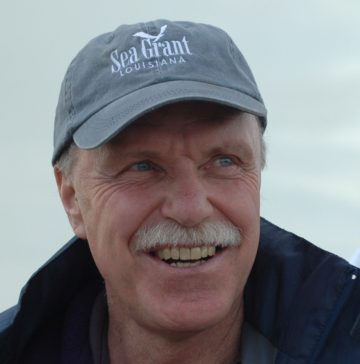
Fisheries in Focus: Busting misconceptions about bottom trawling and its environmental impacts
In a new review paper published in the ICES Journal of Marine Science, researchers argue that well-managed bottom trawling produces sustainable and environmentally friendly food. A review paper is a roundup of all the latest info on a topic – a deep dive into a pool of research papers to pull out the most important aspects. In this case, Hilborn et al., 2023 went over all recent research on the environmental impacts of bottom trawling and boiled them down to four major impacts: Sustainability of target species, Impact on the seafloor, Bycatch and discards, Carbon emissions. The review also compared bottom-trawled seafood to other forms of food production. It concluded that well-managed bottom trawling can produce food with less environmental impact than chicken or pork production. Good, effective management is the key. >click to read< 11:44
‘Pirate’ ship which was attacked by Spanish fisherman sinks in Penzance harbour
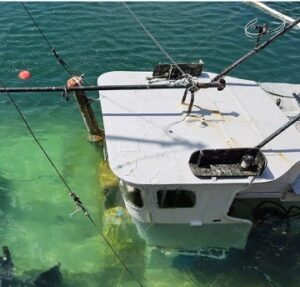 A former fishing boat which was turned into a floating pirate shop has sunk in Penzance harbour in the wake of Storm Antoni. The sad demise of the vessel comes after a remarkable career which began in the early 70s when the Ar Bageergan – which means ‘the eye of the wind’ – worked as a tuna boat and crabber off the French coast, having been built in Brittany in the early 1970s. However she was later sold to a Newlyn fisherman who worked her until 2000 as a drift netter catching cod off the Irish coast, hake in the South West and tuna in the Bay of Biscay. Photos, >click to read< 09:35
A former fishing boat which was turned into a floating pirate shop has sunk in Penzance harbour in the wake of Storm Antoni. The sad demise of the vessel comes after a remarkable career which began in the early 70s when the Ar Bageergan – which means ‘the eye of the wind’ – worked as a tuna boat and crabber off the French coast, having been built in Brittany in the early 1970s. However she was later sold to a Newlyn fisherman who worked her until 2000 as a drift netter catching cod off the Irish coast, hake in the South West and tuna in the Bay of Biscay. Photos, >click to read< 09:35
Emotional tribute to Devon fishermen lost at sea
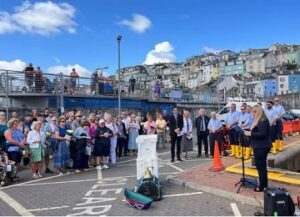 A service has been held in a Devon fishing port to remember the lives of fishermen lost at sea. The tribute in Brixham, organised by the charity Fishermen’s Mission, saw the names of those who have died in Devon waters read out to ensure they are not forgotten. The charity collated a list of 158 names dating back to the Great Gale of Brixham in 1866. The names will be added to a memorial book to be kept at All Saints Church. Helen Lovell-Smith, from the charity, said she began collating names after a conversation with a grieving mother. >click to read< 08:15
A service has been held in a Devon fishing port to remember the lives of fishermen lost at sea. The tribute in Brixham, organised by the charity Fishermen’s Mission, saw the names of those who have died in Devon waters read out to ensure they are not forgotten. The charity collated a list of 158 names dating back to the Great Gale of Brixham in 1866. The names will be added to a memorial book to be kept at All Saints Church. Helen Lovell-Smith, from the charity, said she began collating names after a conversation with a grieving mother. >click to read< 08:15
Three Fishermen Rescued by Coast Guard After Boat Sinks Off Nantucket
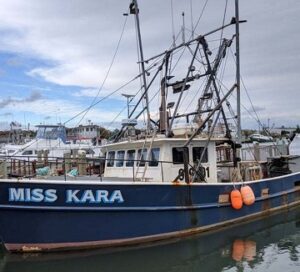 Three fishermen were rescued off Nantucket Saturday afternoon when their 55-foot vessel sank approximately eight miles east of the island. Coast Guard Station Brant Point along with a Coast Guard helicopter from Air Station Cape Cod responded to the area around 1:45 p.m. and found that the 55-foot fishing vessel, F/V Miss Kara out of Hyannis – had already sunk and its crew was in the water. It has not yet been determined why the commercial fishing vessel sank in the waters off Nantucket. Austin said the Coast Guard was alerted to the situation when one member of the Miss Kara crew set off an EPIRB (emergency position indicating radio beacon), which provided the rescue crew with their location. Photos, >click to read< 12:36
Three fishermen were rescued off Nantucket Saturday afternoon when their 55-foot vessel sank approximately eight miles east of the island. Coast Guard Station Brant Point along with a Coast Guard helicopter from Air Station Cape Cod responded to the area around 1:45 p.m. and found that the 55-foot fishing vessel, F/V Miss Kara out of Hyannis – had already sunk and its crew was in the water. It has not yet been determined why the commercial fishing vessel sank in the waters off Nantucket. Austin said the Coast Guard was alerted to the situation when one member of the Miss Kara crew set off an EPIRB (emergency position indicating radio beacon), which provided the rescue crew with their location. Photos, >click to read< 12:36
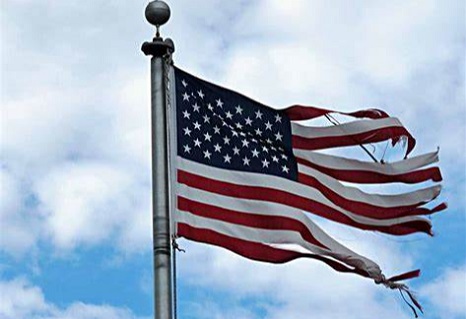
OFFSHORE WIND OPPONENTS NEED A MASS PROTEST IN WASHINGTON DC – BY JIM LOVGREN
In 2010 and 2012 fishermen held two different successful protests in Washington DC with thousands of fishermen travelling from around the country to attend. Both commercial and recreational fishermen voiced their concerns regarding catch shares and Magnuson Act reauthorization, among the multitude of issues that threatened their livelihoods. Today, the fishing industry is facing a far worse enemy then fishery management, as thousands of square miles of their historic fishing grounds have been auctioned off to the highest bidder in order to make way for the wildlife killing machines called wind turbines. These auctions have been held by BOEM, the Bureau of Ocean Energy Management, a part of the Department of the Interior. They are charged with the selling or leasing of US natural resources in our offshore waters, and apparently, they have absolutely no regard for any wildlife that may exist within them, or any people who might derive a living from catching said wildlife. >click to read< 11:50
Former commercial fisherman Samuel “Sammie” Elton Leonard of Calabash, NC. has passed away
 He was born on May 26, 1939 in Shallotte Point, NC. He was the son of the late Lloyd Leonard and Pauline Grissett Leonard. In addition to his parents, he was preceded in death by sisters Joyce Skeen and Dorit Teeters, and brothers Elroy Leonard and Etheridge Leonard. Sammie was quite a successful commercial fisherman, owning a fleet of shrimp boats. He was well respected in the shrimping industry as one of the best. He even designed and took part in the building process of his largest boat, The Big Mama, which dwarfed other boats of its kind. He later owned and operated True Value Hardware in Calabash, NC. Sammie was a jack of all trades and always willing to lend a hand when needed. >click to read< 10:40
He was born on May 26, 1939 in Shallotte Point, NC. He was the son of the late Lloyd Leonard and Pauline Grissett Leonard. In addition to his parents, he was preceded in death by sisters Joyce Skeen and Dorit Teeters, and brothers Elroy Leonard and Etheridge Leonard. Sammie was quite a successful commercial fisherman, owning a fleet of shrimp boats. He was well respected in the shrimping industry as one of the best. He even designed and took part in the building process of his largest boat, The Big Mama, which dwarfed other boats of its kind. He later owned and operated True Value Hardware in Calabash, NC. Sammie was a jack of all trades and always willing to lend a hand when needed. >click to read< 10:40
Why offshore wind jobs may just be a lot of hot air
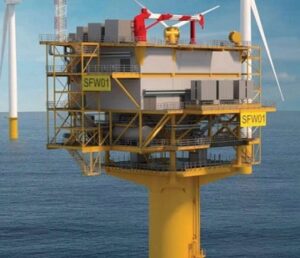 Offshore wind developers in the U.S. have promised to create thousands of “million-dollar” jobs. But those dollars won’t flow into New York workers’ paychecks. Rather, they’re just the sum total of the subsidies local taxpayers and utility ratepayers will expend to keep offshore wind afloat, as if New Yorkers’ electric bills aren’t high enough. Consider Ørsted, the Danish government-owned company that is developing the 12-turbine, 132-megawatt Southfork Wind and the 84-turbine, 924-megawatt Sunrise Wind projects, which will be built 30 miles east of Montauk Point, Long Island. Ørsted is also behind the 98-turbine, 1,100 megawatt Ocean Wind project along the southern New Jersey shore, which just rewarded it with several billion dollars in tax credits that were supposed to have been returned to New Jersey ratepayers According to Ørsted’s Southfork Construction and Operations Plan (COP), Southfork will require 166 construction workers each year during the two-year construction period and another 10 jobs each year for operation and maintenance over the project’s 25-year expected lifespan. >click to read< 09:35
Offshore wind developers in the U.S. have promised to create thousands of “million-dollar” jobs. But those dollars won’t flow into New York workers’ paychecks. Rather, they’re just the sum total of the subsidies local taxpayers and utility ratepayers will expend to keep offshore wind afloat, as if New Yorkers’ electric bills aren’t high enough. Consider Ørsted, the Danish government-owned company that is developing the 12-turbine, 132-megawatt Southfork Wind and the 84-turbine, 924-megawatt Sunrise Wind projects, which will be built 30 miles east of Montauk Point, Long Island. Ørsted is also behind the 98-turbine, 1,100 megawatt Ocean Wind project along the southern New Jersey shore, which just rewarded it with several billion dollars in tax credits that were supposed to have been returned to New Jersey ratepayers According to Ørsted’s Southfork Construction and Operations Plan (COP), Southfork will require 166 construction workers each year during the two-year construction period and another 10 jobs each year for operation and maintenance over the project’s 25-year expected lifespan. >click to read< 09:35
Hundreds of Scots fisherman face losing jobs as new rules brand them too fat to fish
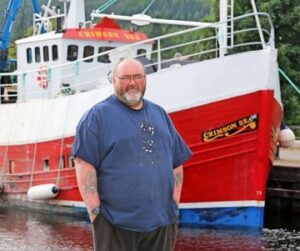 UK Government regulations which are about to come into force will mean seafarers must have a medical certificate showing a body mass index (BMI) of under 35 – or risk being banned from their own trawlers. Crewmen fear they will not be able to go to sea because of the draconian requirements. Furious fishermen branded the Maritime and Coastguard Agency (MCA) rules “discrimination”. Bob Dunsire, 49, who has been skippering prawn boats out of Pittenweem, Fife, since he was a teenager, said he can barely believe what is being done to the industry. He said: “I know I don’t have a BMI under 35 and I’m furious at these new medical requirements. They could see me out of my job and put my entire crew out of work, too. Photos, >click to read< 08:00
UK Government regulations which are about to come into force will mean seafarers must have a medical certificate showing a body mass index (BMI) of under 35 – or risk being banned from their own trawlers. Crewmen fear they will not be able to go to sea because of the draconian requirements. Furious fishermen branded the Maritime and Coastguard Agency (MCA) rules “discrimination”. Bob Dunsire, 49, who has been skippering prawn boats out of Pittenweem, Fife, since he was a teenager, said he can barely believe what is being done to the industry. He said: “I know I don’t have a BMI under 35 and I’m furious at these new medical requirements. They could see me out of my job and put my entire crew out of work, too. Photos, >click to read< 08:00
Fishermen, activists protesting offshore wind projects on the East Coast
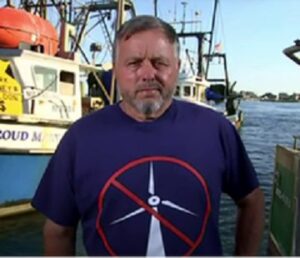 Critics are sounding the alarm on the ecological consequences of the Biden administration’s green energy agenda, specifically the increase marine wildlife deaths in conjunction with offshore wind farms. Activists along with local fishermen are particularly concerned about the rise in whale and dolphin beaching. “What we’re seeing is a failure to properly manage the situation,” Rhode Island fisherman Chris Brown said. “The whales have been migrating from their southern stations during the spring up through the mid-Atlantic region, and they didn’t even slow down the acoustic carpet bombing. And as a result, the Atlantic was littered with the dead whales and dolphins and sharks. There doesn’t seem to be any environmental concern. This is a manmade environmental disaster that’s unfolding. I expect that it will half a whale population in 10 years and probably the same for our fish.”Video, photos, >click to read< 19:17
Critics are sounding the alarm on the ecological consequences of the Biden administration’s green energy agenda, specifically the increase marine wildlife deaths in conjunction with offshore wind farms. Activists along with local fishermen are particularly concerned about the rise in whale and dolphin beaching. “What we’re seeing is a failure to properly manage the situation,” Rhode Island fisherman Chris Brown said. “The whales have been migrating from their southern stations during the spring up through the mid-Atlantic region, and they didn’t even slow down the acoustic carpet bombing. And as a result, the Atlantic was littered with the dead whales and dolphins and sharks. There doesn’t seem to be any environmental concern. This is a manmade environmental disaster that’s unfolding. I expect that it will half a whale population in 10 years and probably the same for our fish.”Video, photos, >click to read< 19:17
Research groups sound alarm after three whales reportedly struck by ships off West Coast
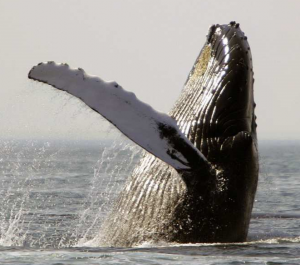 Three whales were reportedly struck by vessels in northern B.C. waters over a 10-day period last month, raising West Coast humpback researchers’ concerns over the risk shipping poses to the marine mammals. The first report involved a BC Ferries vessel, the Northern Expedition, colliding with a whale in Wright Sound near Kitimat on July 20, Fisheries and Oceans Canada (DFO) confirmed. A second incident on July 21 involved a boat that transports workers to Alcan’s Rio Tinto power generation facility in Kitimat. And a cruise ship struck a whale in Hecate Strait between Haida Gwaii and the B.C. mainland on July 29, DFO said. Shipping traffic and humpback whale populations are both on the rise, often in the same areas, escalating the risk of vessel strikes to humpbacks, the greatest threat to the species of special concern along with entanglements in fishing gear.>click to read< 17:46
Three whales were reportedly struck by vessels in northern B.C. waters over a 10-day period last month, raising West Coast humpback researchers’ concerns over the risk shipping poses to the marine mammals. The first report involved a BC Ferries vessel, the Northern Expedition, colliding with a whale in Wright Sound near Kitimat on July 20, Fisheries and Oceans Canada (DFO) confirmed. A second incident on July 21 involved a boat that transports workers to Alcan’s Rio Tinto power generation facility in Kitimat. And a cruise ship struck a whale in Hecate Strait between Haida Gwaii and the B.C. mainland on July 29, DFO said. Shipping traffic and humpback whale populations are both on the rise, often in the same areas, escalating the risk of vessel strikes to humpbacks, the greatest threat to the species of special concern along with entanglements in fishing gear.>click to read< 17:46
Abbott’s Harbour wharf blocked off without notice to fishermen
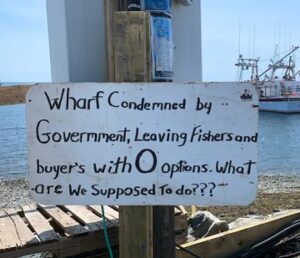 For Pubnico-area lobster fisherman Jaron d’Entremont, the Abbott’s Harbour wharf has been his home port since he began his fishing career six years ago. “One day I was there checking my boat and I saw inspectors there looking around checking underneath the wharf. A month later without any notice they put the blocks there and deemed it unsafe, “Fishermen are permitted to walk down on the Yarmouth County wharf to check their vessels, said d’Entremont, but vehicular traffic is prohibited. Diggdon noted the Abbott’s Harbour wharf is under DFO’s Small Craft Harbour program and is classified as a core fishing harbour meaning “it is deemed critical to the commercial fishing industry.” >click to read< 12:28
For Pubnico-area lobster fisherman Jaron d’Entremont, the Abbott’s Harbour wharf has been his home port since he began his fishing career six years ago. “One day I was there checking my boat and I saw inspectors there looking around checking underneath the wharf. A month later without any notice they put the blocks there and deemed it unsafe, “Fishermen are permitted to walk down on the Yarmouth County wharf to check their vessels, said d’Entremont, but vehicular traffic is prohibited. Diggdon noted the Abbott’s Harbour wharf is under DFO’s Small Craft Harbour program and is classified as a core fishing harbour meaning “it is deemed critical to the commercial fishing industry.” >click to read< 12:28
Oregon imposes new limits on Dungeness crab fishermen to protect whales
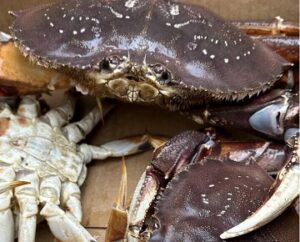 After a lengthy debate, the Oregon Department of Fish and Wildlife Commission voted late on Friday to extend and add on new rules limiting how the state’s Dungeness crab fisherman are allowed to fish, in an effort to protect whales from getting caught in their traps for the next two years. The crustaceans are native to the Pacific Northwest and are one of Oregon’s most profitable products, raking in more than $91 million for the state’s fisherman in the 2021-2022 season. The commission, however, passed a number of regulations in 2020, in response to concerns that migrating whale populations off the coast of Oregon were getting caught in ropes and traps known as crab pots set up by crab fishers and becoming injured or exhausted to the point that they could drown. >click to read< 09:44
After a lengthy debate, the Oregon Department of Fish and Wildlife Commission voted late on Friday to extend and add on new rules limiting how the state’s Dungeness crab fisherman are allowed to fish, in an effort to protect whales from getting caught in their traps for the next two years. The crustaceans are native to the Pacific Northwest and are one of Oregon’s most profitable products, raking in more than $91 million for the state’s fisherman in the 2021-2022 season. The commission, however, passed a number of regulations in 2020, in response to concerns that migrating whale populations off the coast of Oregon were getting caught in ropes and traps known as crab pots set up by crab fishers and becoming injured or exhausted to the point that they could drown. >click to read< 09:44
Devon fishermen’s names to be read in memorial roll call
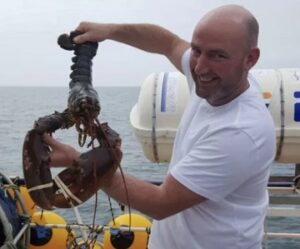 A memorial service for fishermen lost at sea will see the names of those who have died read out for the first time. Among those remembered will be Lewis Mulhearn, who died after being injured when a World War Two bomb exploded underneath his boat. Sunday’s service has been organised by the Fishermen’s Mission. Family and friends of fishermen with a Devon connection who died are invited to add their loved one’s name. The names will be added to a memorial book to be kept at All Saints Church. Lewis Mulhearn died on 21 January, more than two years after the explosion of the wartime device while he was fishing off the Norfolk coast. >click to read< 08:49
A memorial service for fishermen lost at sea will see the names of those who have died read out for the first time. Among those remembered will be Lewis Mulhearn, who died after being injured when a World War Two bomb exploded underneath his boat. Sunday’s service has been organised by the Fishermen’s Mission. Family and friends of fishermen with a Devon connection who died are invited to add their loved one’s name. The names will be added to a memorial book to be kept at All Saints Church. Lewis Mulhearn died on 21 January, more than two years after the explosion of the wartime device while he was fishing off the Norfolk coast. >click to read< 08:49
Donalds introduces bill, The FISHES Act, to help fisheries recover faster from disasters like Hurricane Ian
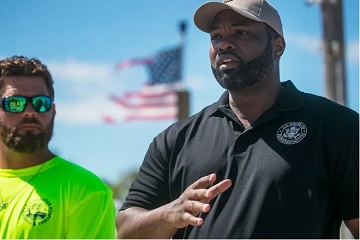 Crabbers, shrimpers and net fishermen all took it on the chin after Hurricane Ian, with some completely out of business, and others struggling to rebuild storefronts, docks and boats. Painfully scarce: government aid dollars, despite a federal disaster declaration. Reviews, red tape and pending inspections make for a long, dragged-out process that takes years to work – if it does at all, says commercial fishing Captain Casey Streeter. The bipartisan legislation spearheaded by Naples Republican Congressman Byron Donalds would “improve the federal regulatory process associated with the allocation of fishery disaster relief (and) expedite the distribution of federal disaster relief following official fishery disasters.” This isn’t just a Florida problem. Nationwide, there are 27 such disaster declarations. “It could be salmon or cod … situations where fisheries are in trouble,” Streeter said, though he’s careful to add the legislation would be a hand-up – “just to get things stabilized – not a hand-out.” >click to read< 07:53
Crabbers, shrimpers and net fishermen all took it on the chin after Hurricane Ian, with some completely out of business, and others struggling to rebuild storefronts, docks and boats. Painfully scarce: government aid dollars, despite a federal disaster declaration. Reviews, red tape and pending inspections make for a long, dragged-out process that takes years to work – if it does at all, says commercial fishing Captain Casey Streeter. The bipartisan legislation spearheaded by Naples Republican Congressman Byron Donalds would “improve the federal regulatory process associated with the allocation of fishery disaster relief (and) expedite the distribution of federal disaster relief following official fishery disasters.” This isn’t just a Florida problem. Nationwide, there are 27 such disaster declarations. “It could be salmon or cod … situations where fisheries are in trouble,” Streeter said, though he’s careful to add the legislation would be a hand-up – “just to get things stabilized – not a hand-out.” >click to read< 07:53
Too Many Seals – Canada’s Pinniped Population Problem
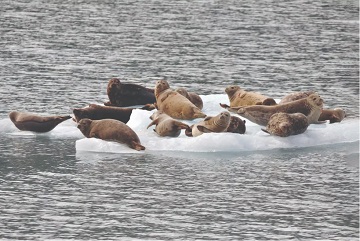 Seals in Atlantic Canada eat a lot of fish every day and there is a great deal of them, coming in at nearly 12 million animals. Their voracious appetite, according to experts, is damaging both the commercial fishery and fish stocks. Bob Hardy has spent a good portion of his life dealing with seals in one way or another. Growing up in Battle Harbour, Labrador, Hardy spent some time taking part in the inshore cod and salmon fisheries. After graduating from university, he spent nine years as a researcher before entering the seafood industry wherein he developed the first seal oil capsule that was commercially available in Newfoundland and Labrador. In 2007, he founded Hardy Fish Co., a fisheries consultancy company, where he took part in projects that researched seal oil, meat and by-product utilization. He has also spent time as a member of the Atlantic Seal Science Task Team. Hardy has since drafted a document entitled, Seals Eat Fish, highlighting the impact the large seal population has on fish stocks and the fishery itself. >click to read< 18:56
Seals in Atlantic Canada eat a lot of fish every day and there is a great deal of them, coming in at nearly 12 million animals. Their voracious appetite, according to experts, is damaging both the commercial fishery and fish stocks. Bob Hardy has spent a good portion of his life dealing with seals in one way or another. Growing up in Battle Harbour, Labrador, Hardy spent some time taking part in the inshore cod and salmon fisheries. After graduating from university, he spent nine years as a researcher before entering the seafood industry wherein he developed the first seal oil capsule that was commercially available in Newfoundland and Labrador. In 2007, he founded Hardy Fish Co., a fisheries consultancy company, where he took part in projects that researched seal oil, meat and by-product utilization. He has also spent time as a member of the Atlantic Seal Science Task Team. Hardy has since drafted a document entitled, Seals Eat Fish, highlighting the impact the large seal population has on fish stocks and the fishery itself. >click to read< 18:56
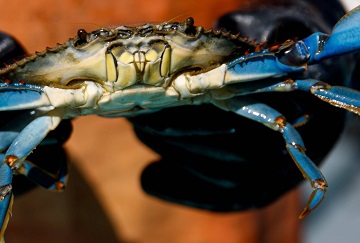
Is the answer to Maryland’s blue crab shortage in Italy?
In Italy, where the blue crab is an invasive species, population numbers are growing quickly and threatening the country’s clam industry, according to a report from Reuters. A local marine biologist told the wire service that invasive “blue crabs” (yes, they really put our beloved crustacean in scare quotes) have eaten up to 90% of young clams in some areas, devastating future production. The leading theory is the crabs were not introduced to Italy’s waters intentionally but arrived in bilge water aboard cargo ships. The region of hit hardest has lots of clam farms, giving the crabs large, dense populations of clams to feast on. Couple that with warmer water, which makes it easier for the crabs to survive the winter, and it “sounds like blue crab paradise,” Colden said. “It’s a perfect Italian vacation spot for the blue crabs in terms of lounging and getting fat and happy,” she said. >click to read< 15:31
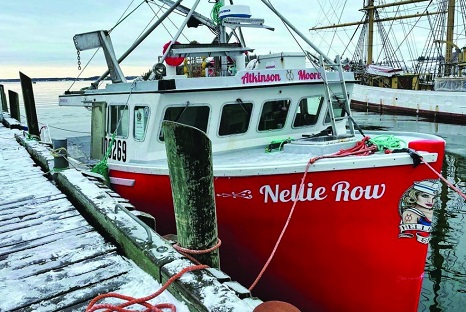
Setting Her Own Course – Lobstering with Lunenburg Harvester Gail Atkinson
Gail Atkinson is one of Canada’s very few female lobster harvesters, who employs an almost entirely female crew aboard the Nellie Row. Gail Atkinson grew up on Cape Sable Island in Southwest Nova Scotia. Coming from a long line of fish harvesters and boat builders, she originally had no desire to follow in her family’s footsteps. “I ended up starting fishing with my father,” said Atkinson. “I started when I was a little bit older because I couldn’t wait to get out of there. But, something happened, and I just ended up back there and I ended up going for a trip fishing, and I just fell in love with it. The rest was history.” Atkinson spent almost 20 years fishing with her father before she went off on her own to run an enterprise. Photos, >click to read< 13:39
Skipper in deep water again after Catlins sinking
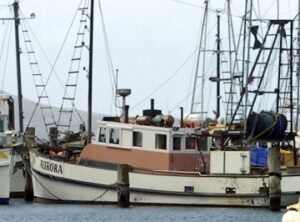 A rogue Dunedin commercial fisherman who flouted maritime rules has, like his vessel, found himself in deep water. Wayne John Jolly, 58, appeared in the Dunedin District Court this week after admitting skippering a ship without appropriate documentation and was sentenced to 250 hours’ community work. The importance of complying with such protocols was resoundingly brought home to Jolly in March last year when his boat Aurora – a 15.6m wooden trawler built in Port Chalmers in 1958 – sank about a nautical mile off the coast of the Tautuku Peninsula, in the Catlins. Jolly’s history of non-compliance with maritime law stretched back 17 years. >click to read< 10:02
A rogue Dunedin commercial fisherman who flouted maritime rules has, like his vessel, found himself in deep water. Wayne John Jolly, 58, appeared in the Dunedin District Court this week after admitting skippering a ship without appropriate documentation and was sentenced to 250 hours’ community work. The importance of complying with such protocols was resoundingly brought home to Jolly in March last year when his boat Aurora – a 15.6m wooden trawler built in Port Chalmers in 1958 – sank about a nautical mile off the coast of the Tautuku Peninsula, in the Catlins. Jolly’s history of non-compliance with maritime law stretched back 17 years. >click to read< 10:02
Oregon crabbers and environmentalists are at odds as a commission votes on rules to protect whales
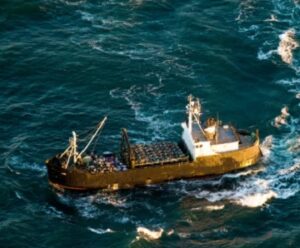 In the wheelhouse of a crab boat named Heidi Sue, Mike Pettis watched the gray whale surface and shoot water through its blowhole. Tangled around its tail was a polypropylene rope used to pull up crab traps. That was in 2004, off the waters of Waldport, Oregon. Pettis, a crab fisherman, said it’s the only time in his 44 years of fishing he has ever seen a whale caught in crab lines, and he believes that is proof such encounters are “extremely rare.” The Oregon Fish and Wildlife Commission is expected to vote Friday on whether to permanently set stricter rules and pot limits put in place in 2020 to protect whales. The restrictions, which were originally supposed to end after this season, would reduce the number of traps, known as pots, and how deep they can drop in the spring and summer months when humpbacks are more likely to encounter them. >click to read< 09:01
In the wheelhouse of a crab boat named Heidi Sue, Mike Pettis watched the gray whale surface and shoot water through its blowhole. Tangled around its tail was a polypropylene rope used to pull up crab traps. That was in 2004, off the waters of Waldport, Oregon. Pettis, a crab fisherman, said it’s the only time in his 44 years of fishing he has ever seen a whale caught in crab lines, and he believes that is proof such encounters are “extremely rare.” The Oregon Fish and Wildlife Commission is expected to vote Friday on whether to permanently set stricter rules and pot limits put in place in 2020 to protect whales. The restrictions, which were originally supposed to end after this season, would reduce the number of traps, known as pots, and how deep they can drop in the spring and summer months when humpbacks are more likely to encounter them. >click to read< 09:01






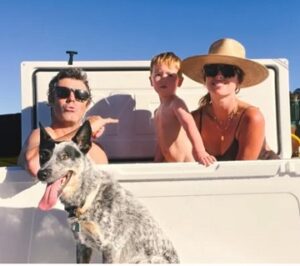
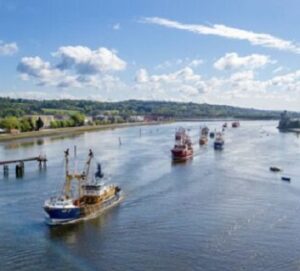
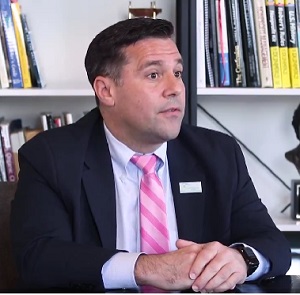



























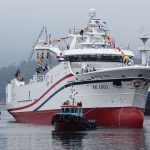
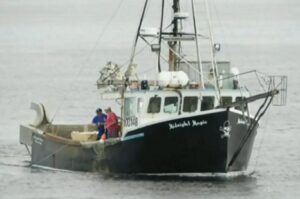
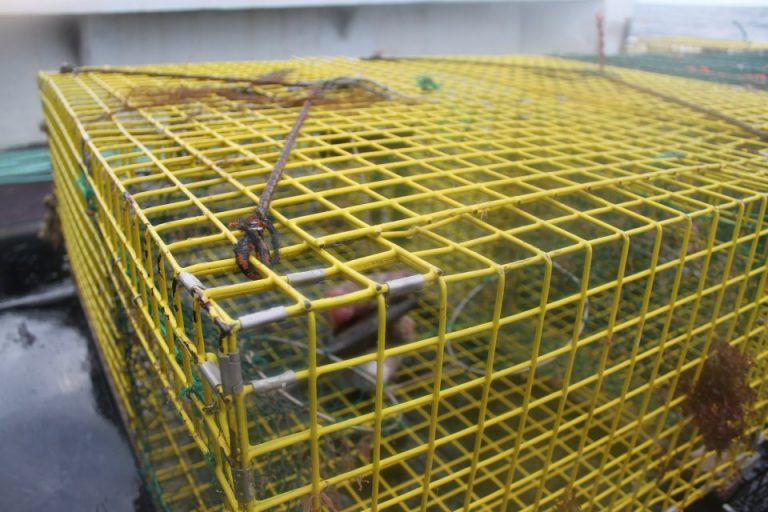
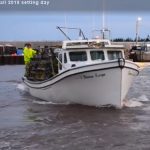
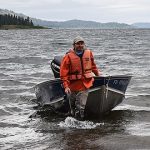
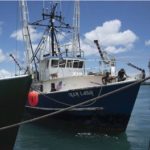
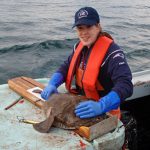
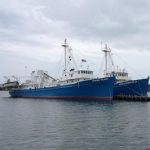




Perplexing Comments by Coughlin, Scutari on offshore wind surprise many involved in industry
Share this post